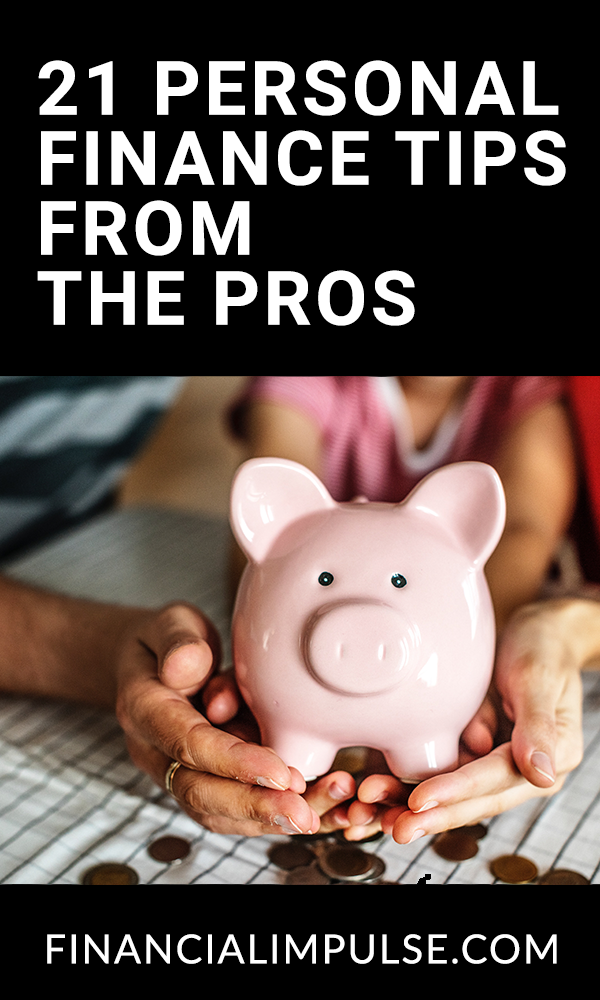We’ve rounded up the 21 best personal finance tips from the experts to help you get started on your financial journey.

This post may contain affiliate links. Please see our disclosures for more information.
Credit card bills, bank statements, and investment options—for anyone just starting out on their financial journey, personal finance can be overwhelming.
Coupled with our lacking financial literacy education, it’s no surprise why personal finance statistics in the U.S. are pretty dismal. After all, how are we expected to be able to handle our finances if we were never taught some of the most crucial lessons?
That’s why we’ve rounded up the 21 best personal finance tips from the pros.
Coming from executives, business owners, and professional experts, consider these words of wisdom as your basic introduction to personal finance.
All Tips
1. Save 10-20% of your paycheck
Have you made saving a habit yet? If not, now’s the time.
Alison Norris, strategy manager and certified financial planner at SoFi, emphasizes the importance of regularly saving a portion of your paycheck for both your short- and long-term goals.
“Instead of making saving an afterthought,” says Norris, “you should internalize the habit of saving money first, either to pay down debt or grow your investable assets, and then only spending what you have left.”
2. Track your expenses
“Many of us have no idea what our expenses add up to every month,” Carla Dearing, CEO of Sum180, an online financial wellness service, says. “But knowing this will empower you to better align your spending to your priorities and zero in on ways to save.”
Sound a bit tedious to track your expenses? It doesn’t have to be.
As Dearing notes, “A simple spreadsheet can do the trick or, if you prefer, use an online money tracking service (like Mint or Quicken) to see all your financial accounts in one place and create your first budget. Do this and you will always know where you stand financially.”
3. Invest while you’re young
“Young people have an incredible investing advantage over others: time,” Brian Barnes, founder and CEO of M1 Finance, says. “Whatever you save now will be worth 10-20 times as much in 30-40 years, so be sure to take advantage of the magical powers of compounding and start investing for retirement early.”
That’s right—compounding interest may very well be your best friend as a young adult. You can think of it as interest on interest; in other words, the gains made from simple interest magnify as time goes on.
Barnes suggests minimizing high investing costs and taxes by choosing low-cost or tax-advantaged accounts like an IRA. He adds: “The best way to stick to the habit of investing for your retirement is to automate it; saving, for instance, $50 to $100 per week will go a long way toward making a healthy contribution to your IRA. If you can pay yourself now, your future self will thank you later.”
4. Create an emergency fund
If you don’t already have one, start setting aside money for an emergency fund.
“Having one acts as a financial buffer between you and unexpected expenses like your car breaking down,” says Veneta Lusk, the blogger behind Becoming Life Smart. “Start with $1,000, which can cover many surprises such as a flat tire or a dishwasher repair. Keep saving until you’ve built a fund with 3-6 months of living expenses.”
Make sure you separate your emergency fund from your regular savings; otherwise, you may accidentally count it towards your larger savings goals.
5. Start a side hustle
It’s the battlecry of millennials—and for good reason.
As financial blogger Stacy Caprio says, “Saving is not the only way to bank more money… Earning more is also a way.”
Having a side hustle means you’ll have more streams of income—not to mention, diversified income. In other words, besides extra cash, a side hustle doubles as a safety net should any trouble arise with your full-time work.
Note that this doesn’t have to be a second job or 20 hours of part-time work a week. A side hustle could also easily be just a few hours a week (or month) devoted to babysitting, driving for Lyft, or freelance writing.
6. Watch out for depreciating assets
The term “depreciating” is often used in a business context to describe property or equipment that loses value over time. But it also happens to be relevant to personal finance—specifically the kinds of items you choose to spend your money on.
As Matthew Frankel, certified financial planner and personal finance expert at The Ascent, says, “Beware of spending too much on depreciating assets such as cars, and financing these assets over excessively long time periods.”
“For example, if you buy a $30,000 car at 6% interest and a 72-month term, you’ll end up paying $497 per month and a total of about $35,800. And, at the end of the six years, you’ll be lucky if the car is worth $11,000 based on average depreciation rates. If you’re going to splurge on anything, do it on things that hold their value better than that, and use as little debt as possible to do it.”
7. Learn to budget
Beyond tracking your expenses, you should also learn how to budget.
“A budget means you’ll be telling your money what to do instead of wondering where it went,” says financial coach Karen Ford. “If you can create a budget and follow it, you’re in the driver’s seat and in control of your money.”
That’s because budgets help you plan how to spend your income, whether that means rent, utilities, groceries, entertainment, debt, or something else. This way, you’ll be less likely to overspend on just one category.
8. Avoid carrying credit card balances

There’s a lot of power that comes with owning a credit card—and with great power comes great responsibility.
As president of financial service firm Saturn Wealth Charisse Mackenzie says, “Try not to carry balances on credit cards. Use them to build your credit but pay them off monthly. If you happen to wind up paying interest, pay the card with the highest interest rate down first.”
Some people believe that carrying a credit card balance is good for your credit score—but that couldn’t be further from the truth. Your credit will be just fine if you pay off the balance every month. What’s more, paying off the balance every month means you won’t have to worry about paying high interest rates or sinking into debt.
9. Know your net worth
“One of the most important numbers on any company’s financial statements is owner’s equity, otherwise known as net assets,” Joshua Li, CPA and former auditor at PricewaterhouseCoopers, says. “The net asset value, calculated by subtracting total liabilities from total assets, provides stakeholders with a clear snapshot of a company’s financial health. Similarly, your net worth is one of the best indicators of your own financial health.”
That is, how much do you own and how much do you owe? Although some people shy away from looking at this number, your net worth provides a big picture of where you are financially. In this way, knowing it serves as a starting point for planning your financial goals.
10. Automate your finances
How much time do you spend on managing your finances each month?
If it’s a lot, you can reduce it by automating your finances.
As Vladamir Sobur, content executive at Moshes Law, explains, “When you automate your finances, you then have no excuse not to do the things you’re supposed to do… The truth is you can have a great plan and a great budget laid out but our human nature has the tendency to mess us up when it comes to money. By automating your finances, you can trick yourself into saving more, avoiding bad spending habits, and spending less time managing your accounts. This means more time and more money for you without you really having to do anything.”
That includes your bills, savings, and investments—making these payments and deposits automatic will mean growing them through a hands-free approach.
11. Open a health savings account (HSA)
Jen Auerbach-Rodriguez, director and head of Strategic Growth Markets for Merrill Lynch, calls health savings accounts (HSA) the “new 401(k).” That’s because, in Auerbach-Rodriguez’s words:
“HSAs allow you to save for qualified health expenses with significant tax advantages… Not only are your contributions and withdrawals tax-deductible, you can invest your contributions with the potential to grow tax-free over time. And unlike other ‘use it or lose it’ vehicles, HSAs can be used to fund qualified healthcare expenses both today and well into retirement.”
Auerbach-Rodriguez nails it on the head: HSAs are useful for planning specifically for healthcare costs so that you don’t have to dip into your other savings.
12. Invest in yourself

Making healthy personal finance choices isn’t limited to decisions about saving or investing. It also involves pursuing professional development opportunities and ways to improve yourself.
As Marc from Vital Dollar says, “Earning some sort of certification or getting further training or education can make a huge difference in your earning potential and to your overall financial picture.”
This could mean reading self-help books, taking online courses, or even pursuing a whole new degree. Investing in yourself won’t always be free, but there’s potential for great payoff, whether in a new job or through career advancement.
13. Don’t confuse “safe” with “secure”
Certified financial planner and owner of Spark Financial Advisors Lauren Zangardi Haynes describes why understanding this distinction is important:
“I speak to many people who tell me they want safe investments. They don’t want to lose any money. I understand—the stock market can be very volatile and downright scary at times. Unfortunately, if you have all of your savings in cash or bonds, you may have a hard time reaching your financial goals and enjoying a secure retirement. Speak with a fiduciary financial planner who will help you figure out a strategy to reach your goals.”
14. Learn to manage your cash flow
One undeniable constant in life is change.
Our circumstances hardly remain stable, including our finances. We’ll see major events through the years—both good and bad. And many of us will face the same milestones like school, unemployment, getting married, and starting a family.
According to Jennifer McDermott from the personal finance comparison website, finder.com, it’s thus important to “have a good grasp on managing cash flow to deal with these peaks and troughs in life, with a budget that keeps your spending well within your means and an emergency fund to cushion the unexpected lows.”
15. Understand the impact of filing insurance claims
“Growing up, many of us are under the impression that we should file a claim with our insurance company whenever something goes wrong or is damaged,” says Fuad Hasanovic from Compass Insurance Agency.
“The truth is, there are many instances where you should not file an insurance claim. Even if your policy covers the damages, you might be better off paying for the repairs yourself than filing a claim and having your insurance pay. The claim will go on your record and will have an impact on your deductible and premium in the near future. You really have to think long term if having your insurance pay for a small $800 repair is worth having your premium jump $100 a month (for example).”
16. Take care of your credit score
Unfortunately, credit scores are another number you need to keep track of in your finances. Ranging from 300 to 850, credit scores represent how creditworthy you are—or, in simple terms, how likely you’ll pay your bills.
This matters because, as Amy Blacklock and Vicki Cook, co-founders of Women Who Money, say, “A good credit score opens up a world of opportunities for you.” For example, that includes lower interest rates on loans, higher chances of approval on rental agreements, savings on utilities, auto insurance premiums, and even cell phone contracts.
Your credit score changes over the course of your lifetime, so don’t panic if it’s not currently where you want it to be. You can take care of it, advise Blacklock and Cook, by “keeping your credit utilization low and paying your balances in full and on time.”
17. Set long-term financial goals
Have you ever thought about where you’d like to be in 10 years? How about in 20?
Setting long-term goals means having something to plan for. They don’t have to be so detailed, but a general idea of where you want to be makes for a good starting point.
“If you don’t start thinking now about things like retirement savings, the importance of an emergency fund, and saving money for the college education of your kids,” warns David Bakke from Money Crashers, “you’ll be too old to do anything about it by the time it really matters.”
18. Negotiate your salary
It’s not easy to ask for more money—and too often, we don’t because we’re afraid of how it may come across. But negotiating your salary is normal for both career advancement and making sure you’re fairly compensated.
Here’s how to do so, according to financial blogger Cody Berman from Fly to FI:
“Show up prepared. Create a detailed list of why you are valuable to the company, not why the company is valuable to you. Bring samples of your previous work to further support your value claim. Everything is based on your perceived value. If the company feels that you are the most qualified candidate, you have all the leverage. Your boss and your company are your clients, not your dictator. Get paid what you’re worth!”
19. Small purchases count more than you expect
Your daily spending habits affect your finances in the grand scheme of things, no matter how small or trivial they seem.
As Dr. John Story, an associate professor at the University of St. Thomas’s Cameron School of Business, says, “For many people, the small, everyday spending decisions, like eating out and $4 lattes, have a greater impact on their financial independence than the rare big decision, like buying a car.”
The big takeaway here: watch your consumption habits.
20. Don’t compare yourself to those on social media

If you’ve ever found yourself envying an old classmate’s lifestyle based on their Instagram, take a step back. J.R. Duren, a personal finance analyst and senior editor at HighYa, puts it perfectly:
“Our life is hard enough as it is without the added pressure of our friends and acquaintances posting as if their life is perfect and they have the financial means to buy whatever they want whenever they want… Everyone seems to be doing well when, in fact, they’re probably just as in-debt and struggling as they are.”
That’s right—even people with six-figure salaries live from paycheck to paycheck.
To avoid falling into the comparison trap, Duren advises, “Be wary of what you conclude about your financial status based on how people present themselves on social media. Let your budget and your bank accounts tell you how well you’re doing, as they’re the factors in your life over which you have the most control.”
21. Use your money to get the life you want
Finally, personal financial strategist Brie Sodano offers a gem for both money experts and newbies alike:
“There are end goals and means goals. Money is always a means goal. Use your money to get the life you want, not your life to get the money you want.”
In other words, there’s more to life than money. Reaching a certain net worth or savings amount is a major accomplishment, but this kind of goal matters more for where it can lead you. Mastering personal finance is ultimately a stepping stone to creating the life you want—it shouldn’t be your final end game.






I really love this list and enjoy that you included reminders about the social component of money!
It’s a great starter list for someone new to personal finance, but it’s also a good list to go through if you’ve been at it for a while and dived in deep while needing a reminder of the basics. Sometimes I’m surprised by how many components there are to keep track of! For example, now that we are debt free I don’t think about my credit score much, but there are still several great reasons to stay on top of it. For example, I think it makes our house insurance cheaper!
Thanks so much! Really appreciate your kind words. You’re right that personal finance has so many components to keep track of, many of which are interconnected. It can be so overwhelming for anyone just getting started in cleaning up their finances or learning about what they actually entail.
Great post!
Thanks so much!
Thanks for sharing all above tips. I really want to save and budget on overspending limits.
Glad you found these tips helpful, Maria!
Some great tips, particularly no 8. Having worked in banking most of my career, I have seen first hand the destructive nature of too much consumer debt, particularly credit cards. Strangely in an environment of the lowest interest rates in history, credit card interest still starts in the 20% region.
It is obvious our ‘friendly’ banks know that they have credit card holders well and truly over a barrel. Excellent advice to pay your credit cards down as quickly as possible and then take some scissors to the plastic and rid yourself of these menaces forever.
Thanks for your kind words! To clarify, it’s not necessary to get rid of credit cards altogether—but simply to avoid carrying a balance on them from month to month.